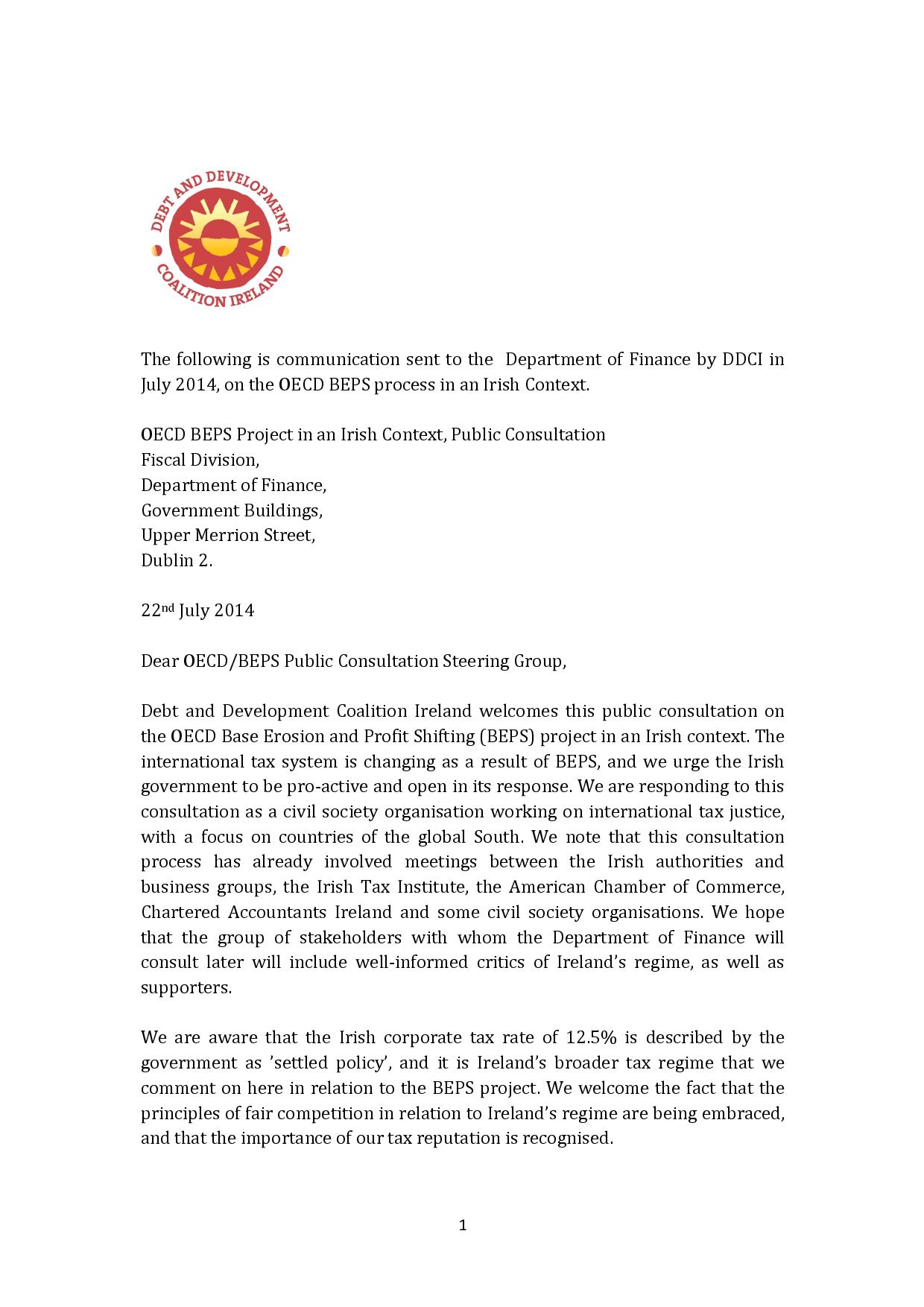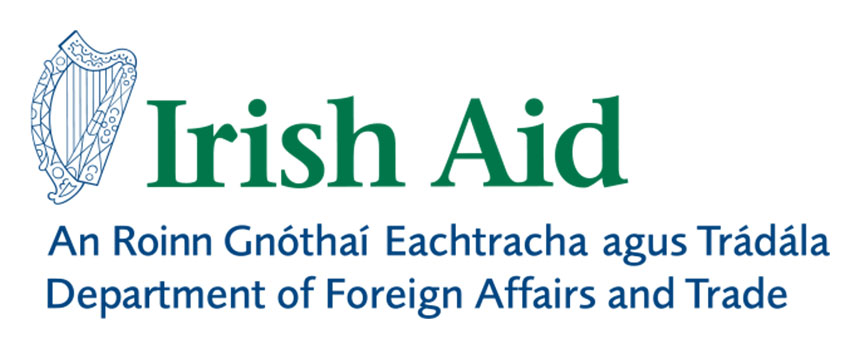DDCI submission to the OECD BEPS process, July 2014
23 July 2014

The following is communication sent to the Department of Finance by DDCI in July 2014, on the OECD BEPS process in an Irish Context.
OECD BEPS Project in an Irish Context, Public Consultation
Fiscal Division,
Department of Finance,
Government Buildings,
Upper Merrion Street,
Dublin 2.
22nd July 2014
Dear OECD/BEPS Public Consultation Steering Group,
Debt and Development Coalition Ireland welcomes this public consultation on the OECD Base Erosion and Profit Shifting (BEPS) project in an Irish context. The international tax system is changing as a result of BEPS, and we urge the Irish government to be pro-active and open in its response. We are responding to this consultation as a civil society organisation working on international tax justice, with a focus on countries of the global South. We note that this consultation process has already involved meetings between the Irish authorities and business groups, the Irish Tax Institute, the American Chamber of Commerce, Chartered Accountants Ireland and some civil society organisations. We hope that the group of stakeholders with whom the Department of Finance will consult later will include well-informed critics of Ireland’s regime, as well as supporters.
We are aware that the Irish corporate tax rate of 12.5% is described by the government as ’settled policy’, and it is Ireland’s broader tax regime that we comment on here in relation to the BEPS project. We welcome the fact that the principles of fair competition in relation to Ireland’s regime are being embraced, and that the importance of our tax reputation is recognised.
The main risk to Ireland’s reputation comes from companies aggressively using Ireland to avoid global tax. The Department of Finance has pointed to the interplay between the different tax regimes of the countries in which multinationals operate as being the factor that allows aggressive tax planners to take advantage of Ireland. However, we argue that it is the responsibility of the Irish government to pro-actively take steps to close down aggressive tax planning practices. Hosting stateless companies was indefensible, and therefore it was positive and necessary that pre-emptive steps were taken in the last budget by the Mininster for Finance to eliminate this. This is a good precedent, and we urge the government to take more pre-emptive steps, rather than waiting for the BEPS outcomes and being seen, internationally, as a reluctant complier. A slowness to act in the face of inevitable change internationally would damage our reputation and potentially threaten inward investment. In this submission, we ask that the government gives early signals of change to our tax regime rather than lagging behind and being moved forward only by multilateral action in the BEPS agenda.
Ireland’s challenge in relation to BEPS is to remain competitive, since we are so dependent on FDI, while ensuring that our system is not open to abuse by multinational firms engaging in aggressive international corporate tax avoidance. Unfortunately, Ireland is already very much on the international radar as a country through which funds have been channelled away from the tax net – a “conduit country”, like The Netherlands and Luxembourg. This is bad for our mainstream tax reputation, and may damage our ability to attract businesses with real economic activity, the very businesses we need to create much-needed employment. Therefore, we should take as a guiding principle from BEPS the idea that taxation rights should follow real economic activity. In that way, companies should really only be able to avail of our low corporate tax rate if they are engaged in meaningful economic activity here, creating real jobs.
Which of the international tax issues identified in the BEPS Action Plan would need to be considered the highest priorities for Ireland for examination with a view to action?
1. Transfer Pricing
Ireland’s current transfer pricing rules, while compliant with international standards, only apply in situations where transfer mis-pricing is used to channel profits out of Ireland. They should be amended to cover the situation where transfer mis-pricing is used to channel profits into Ireland as well as out. This would be a small innovation which would lay down a clear marker that Ireland is serious about tackling international tax avoidance. It would not adversely impact on the profitability or tax bills of any firm which is not engaged in transfer mis-pricing.
Within the Action 13 on the ‘Re-examination of transfer pricing documentation’ is the mandate to develop a template for country-by-country reporting (CBCR). We believe that CBCR should be an essential tool for evaluation of all BEPS issues and risks, and not only of transfer pricing. It should include the worldwide consolidated accounts of each multinational corporate group with data on profits, taxes due, taxes paid, employees, sales and assets in each country, along with the names of subsidiaries in each country. To promote transparency in the international tax regime, we urge the Irish government to actively push for this information to be part of any CBC reporting template, and that this information should normally be made public, with the obligation to prepare all information on the parent company, and supplied directly to every country in which it has a taxable presence.
2. Tax Treaties
Tax treaties are an integral part of the international tax system that is currently being reviewed by the OECD. Tax treaties can be at least as important as tax rates. DDCI believes that all tax treaties should have a core provision to prevent both double taxation and double non-taxation, and that this provision should take the form of a substantive article with the wording from the St. Petersburg Declaration: ‘The object and purpose of this treaty are to ensure that profits are taxed where economic activities occur and value is created’ , in line with the objective of the BEPS project.
It is welcome that in all new treaties, Ireland now includes an exchange of information clause. However, it is unclear what provisions, if any, are made to ensure that this exchange of information can happen on an automatic basis, or that the counter parties to the treaties are made aware of what information is available to be exchanged. Ireland should announce a general review of the information exchange clauses in our network of tax treaties, with a broad scope which includes examining the feasibility, in practice, of information being exchanged. This should include, for example, issues of ICT compatibility and capacity and soft knowledge exchange about the types of information each taxing authority stores. An information-exchange clause which is not practical for these reasons is essentially useless. Such a review would not be wasted in the event of the OECD moving on a single, multi-lateral treaty, as the underlying issues of compatibility would still need to be addressed.
DDCI believes that particular attention should be paid to Ireland’s nine development cooperation partner countries in this context, and that Ireland should actively support the development of their capacity to participate on an equal footing in information exchange. As data protection structures, confidentiality and data security are critical elements for Ireland in any automatic exchange of information, it would make sense to support capacity development in these areas.
In the multilateral Convention under consideration by the Expert Group under Action Point 15, the core provision making it clear that tax treaties aim to prevent both double taxation and double non-taxation should also be present, and any such Convention should to be open to accession by all countries, without any preconditions.
Are Ireland’s company residence rules appropriate in the context of BEPS and other international tax developments?
DDCI believes that Ireland’s residence rules should be amended slightly to add a default Irish residence unless an alternative claim is made. In that way, companies registered in Ireland will either be resident in Ireland or somewhere else. A default to Irish residence will motivate companies to provide the alternative information, if it applies.
The guiding principle of BEPS – that tax should follow the location of real economic activity – offers a serious opportunity for Ireland if we move on this in advance of the final BEPS outcomes. We have a competitive tax system. We should act now to ensure that it attracts real economic activity, and not wait until the rest of the world is forced by BEPS to take a similar action.
Are there other current international tax proposals that would be of concern to Ireland?
As an organisation with a focus on countries of the global South, we strongly urge the Irish government to recognise the exclusion of these countries in the current OECD/G20 process, and to deal with this proactively. The impact of this exclusion should be a focus of analysis in the government’s current spillover analysis on Ireland’s tax policy and its impact on developing countries, and its findings should be taken into account in all of Ireland’s positions on BEPS. The UN’s Financing for Development Office (FfDO) has appealed to member states to support its capacity development programme, aimed at strengthening the capacity of the ministries of finance and the national tax authorities in developing countries to develop more effective and efficient tax systems. Ireland’s support for the strengthening of the UN’s FfDO and its role in global tax dialogue, advocating for this and providing financial resources to support it, would both fulfill Ireland’s policy commitment to supporting countries of the global South to raise more of their own taxes, and support them to have the capacity to engage more meaningfully in international policy-making on tax in the currently OECD dominated process.
What are the critical considerations in shaping Ireland’s response to current international tax developments?
Countries of the global South are sorely disadvantaged when it comes to equal participation in global tax rule-making, and in their capacity to negotiate the existing tax rules. As states internationally change their tax rules in line with the BEPS process, a core concern here will be the impact on Ireland’s economic development, jobs and inward investment. However, it is now broadly recognised that the tax policy of one country impacts on other countries. We should therefore also keep a focus on the impact of our tax regime on other countries. DDCI believes that tax is a global justice issue; illicit financial flows, including tax dodging, costs people in Europe €1 trillion per year, and countries of the Global South up to €870 billion. These are resources that could be put to use for vital public services for millions of people around the world, including in Ireland and countries of the global South.
We would be happy to meet to discuss any of these issues further.
Ends.
Debt and Development Coalition Ireland is an organisation working on debt and tax justice, with a focus on countries of the global South – www.debtireland.org. Our work on Tax Justice is supported by the European Union, but can in no way be taken to reflect the views of the European Union.


